人教版 高中 英语 选修七 Unit 5Travelling abroad复习课件(共43张PPT)
文档属性
| 名称 | 人教版 高中 英语 选修七 Unit 5Travelling abroad复习课件(共43张PPT) | 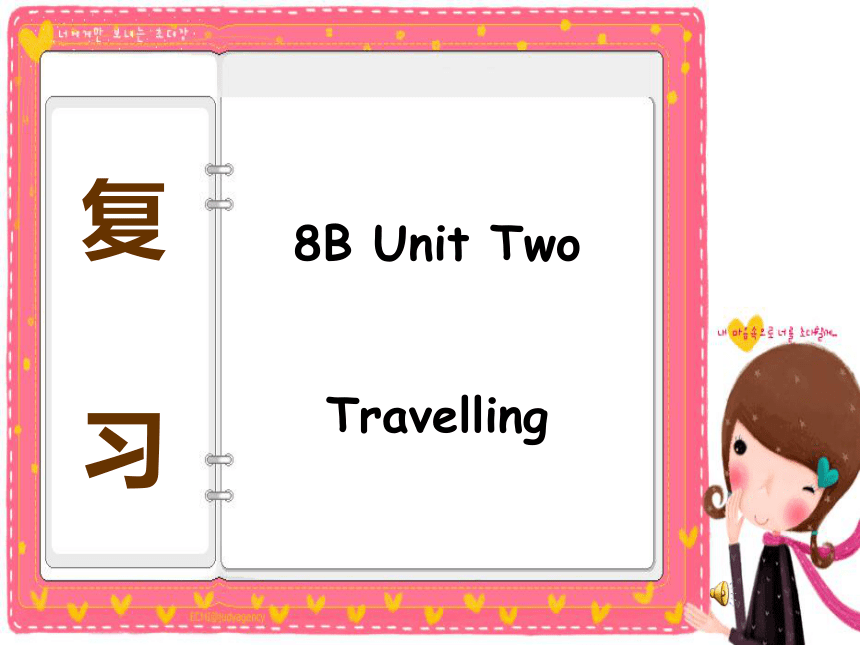 | |
| 格式 | zip | ||
| 文件大小 | 1.8MB | ||
| 资源类型 | 教案 | ||
| 版本资源 | 人教版(新课程标准) | ||
| 科目 | 英语 | ||
| 更新时间 | 2020-03-24 11:51:17 | ||
图片预览

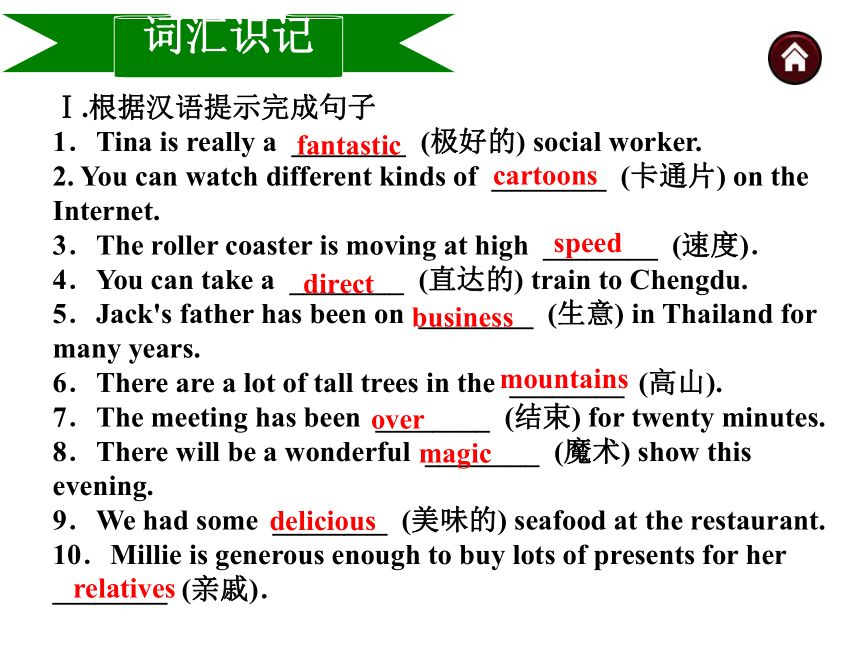
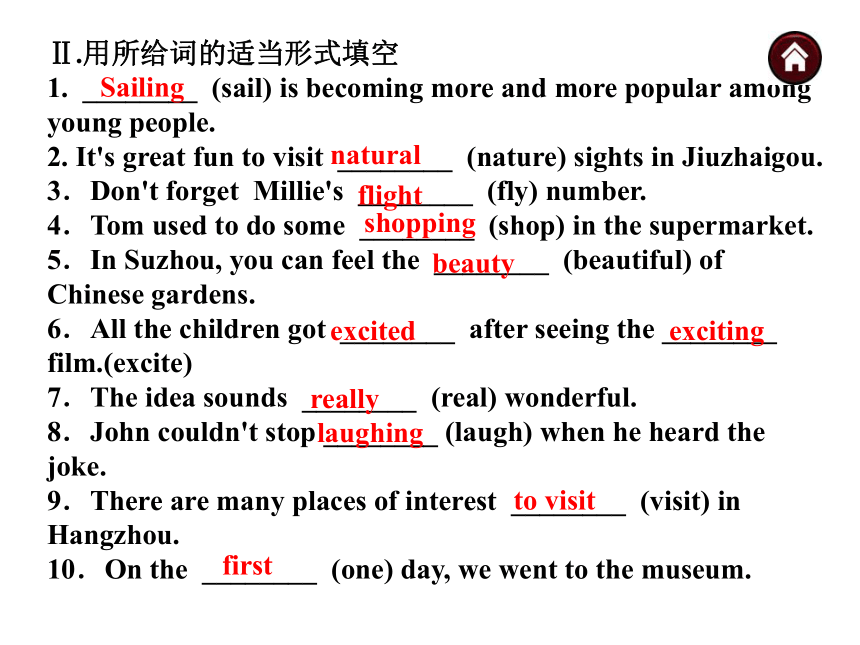
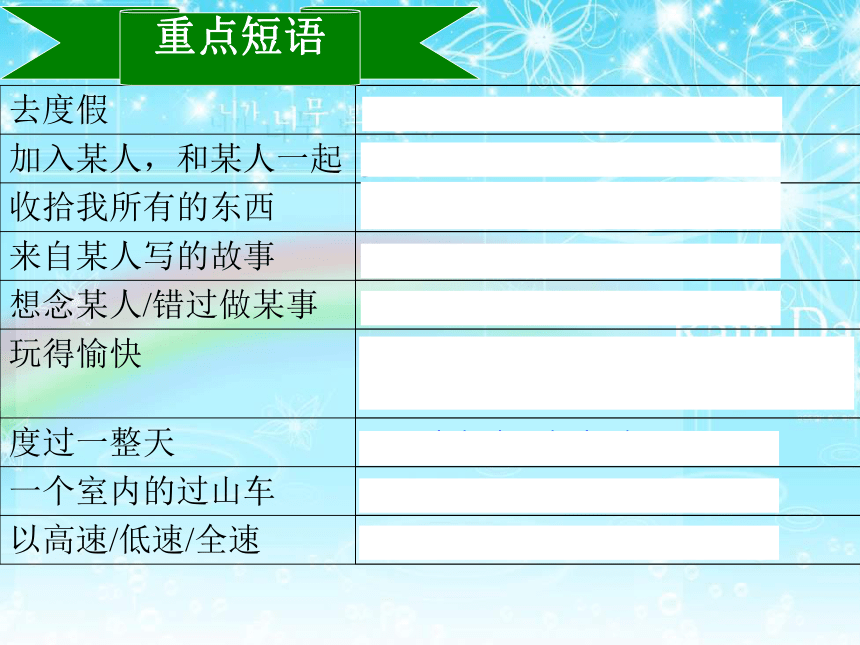
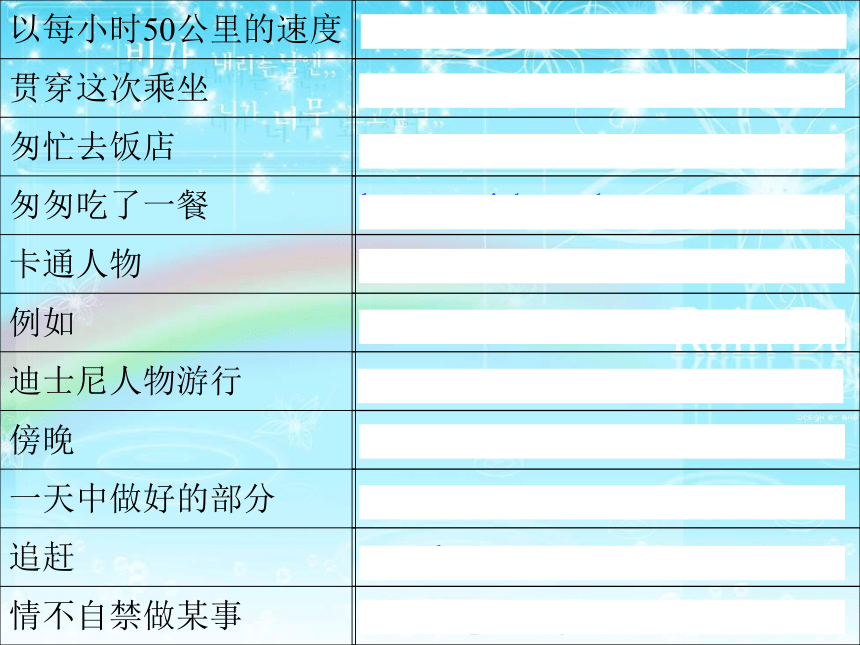
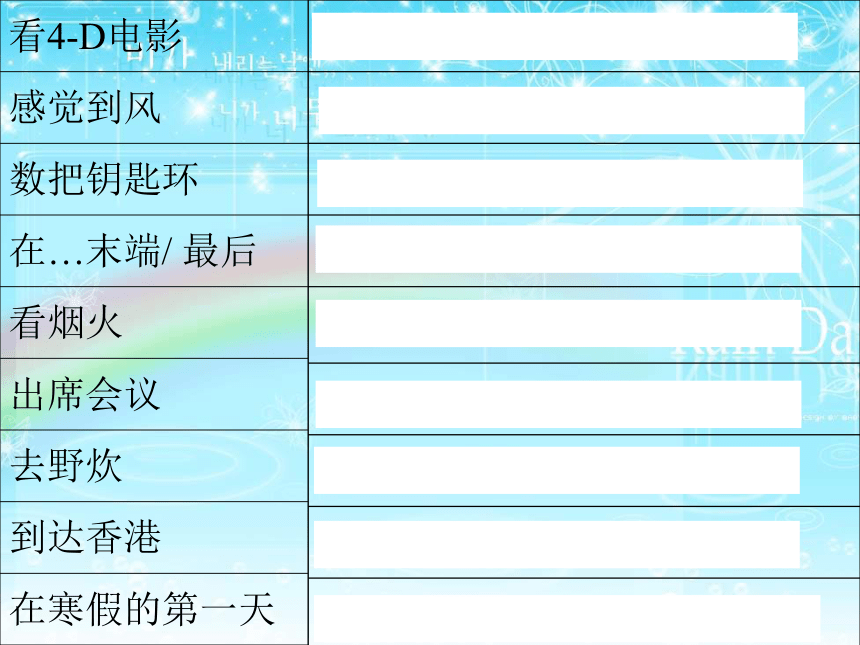
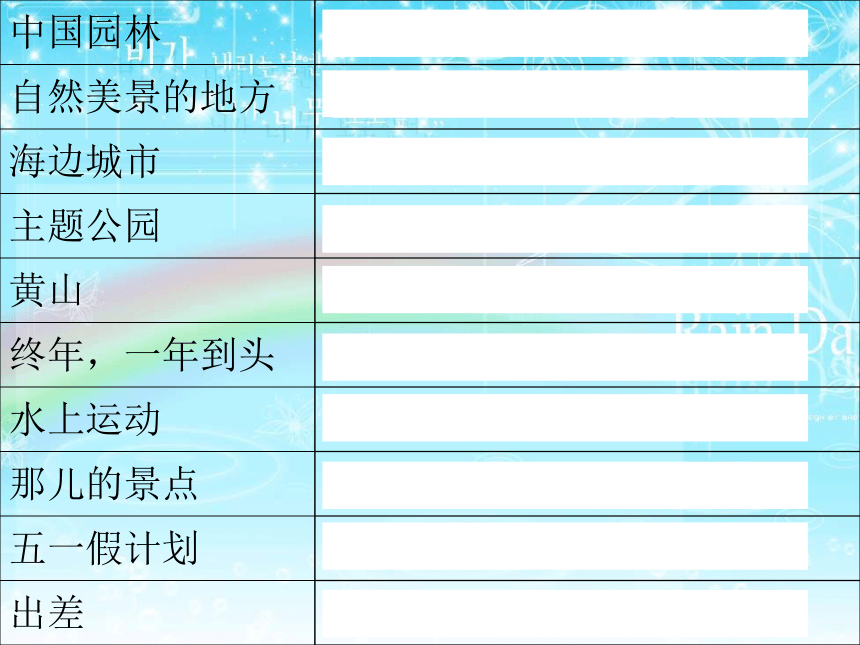
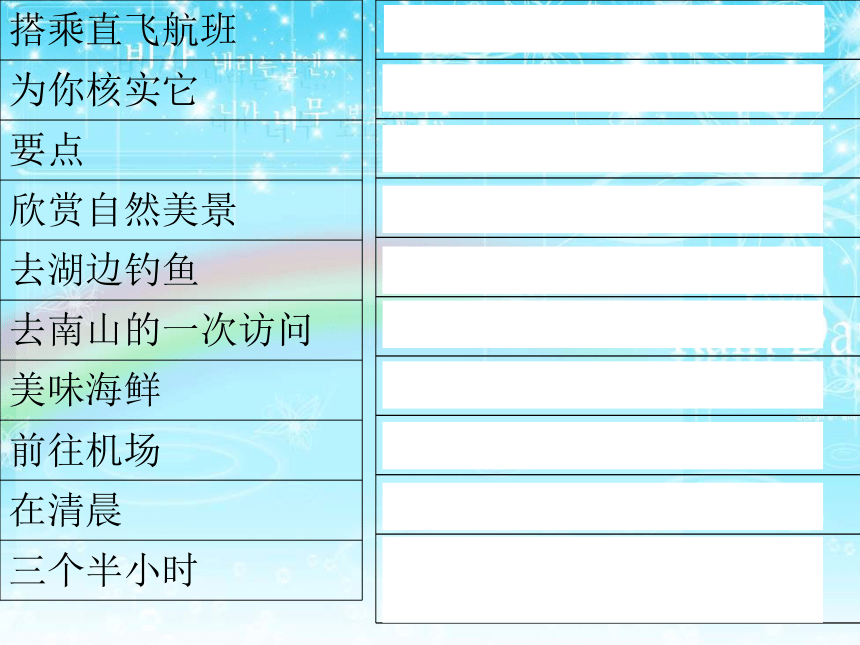
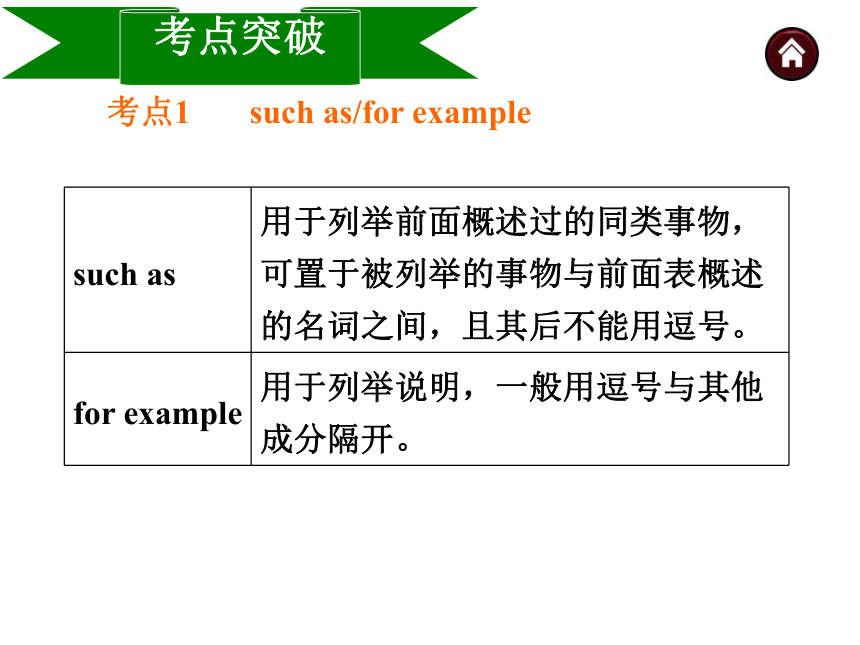
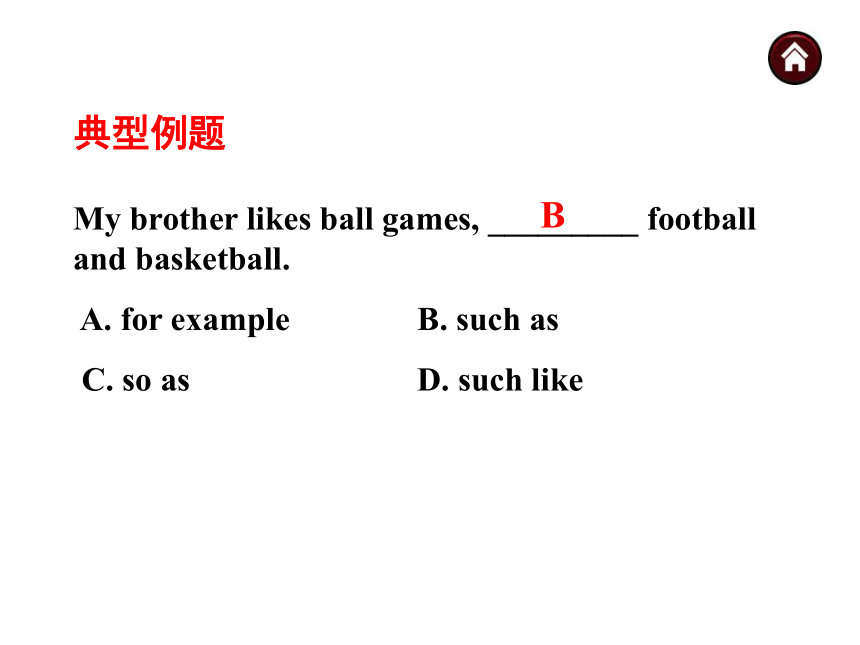
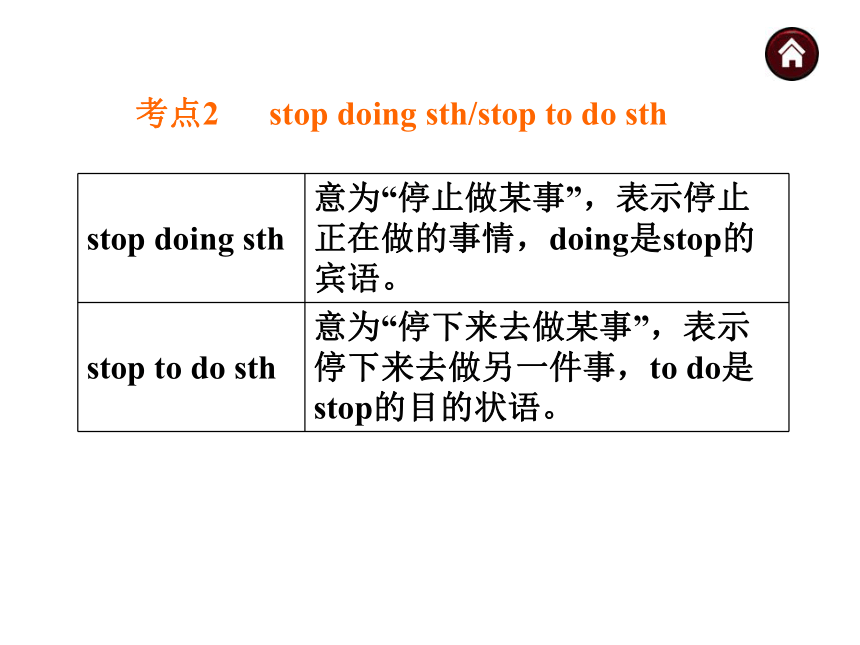
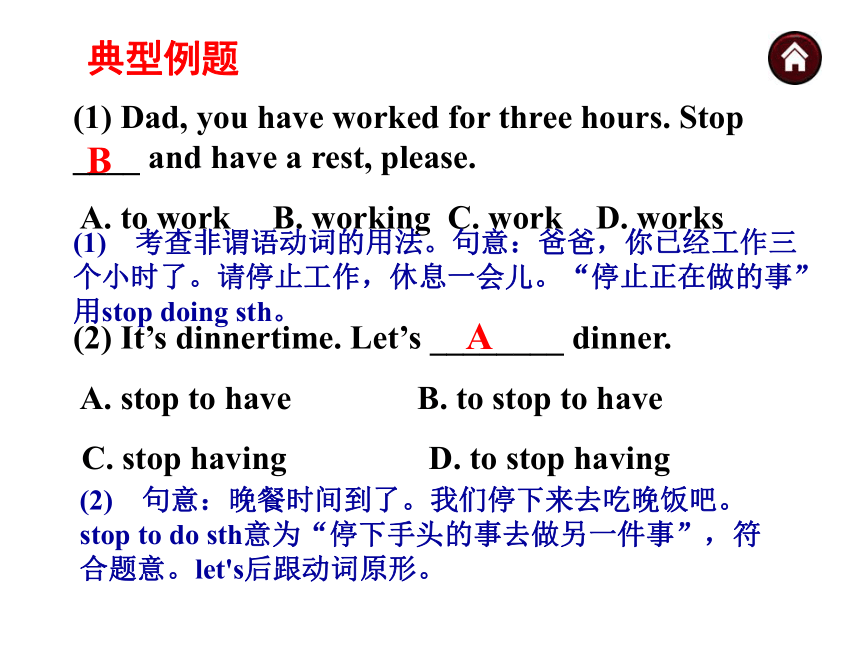
文档简介
(共43张PPT)
8B Unit Two
Travelling
复 习
Ⅰ.根据汉语提示完成句子
1.Tina is really a ________ (极好的) social worker.
2. You can watch different kinds of ________ (卡通片) on the Internet.
3.The roller coaster is moving at high ________ (速度).
4.You can take a ________ (直达的) train to Chengdu.
5.Jack's father has been on ________ (生意) in Thailand for many years.
6.There are a lot of tall trees in the ________ (高山).
7.The meeting has been ________ (结束) for twenty minutes.
8.There will be a wonderful ________ (魔术) show this evening.
9.We had some ________ (美味的) seafood at the restaurant.
10.Millie is generous enough to buy lots of presents for her ________ (亲戚).
fantastic
cartoons
speed
direct
business
mountains
over
magic
delicious
relatives
词汇识记
Ⅱ.用所给词的适当形式填空
1. ________ (sail) is becoming more and more popular among young people.
2. It's great fun to visit ________ (nature) sights in Jiuzhaigou.
3.Don't forget Millie's ________ (fly) number.
4.Tom used to do some ________ (shop) in the supermarket.
5.In Suzhou, you can feel the ________ (beautiful) of Chinese gardens.
6.All the children got ________ after seeing the ________ film.(excite)
7.The idea sounds ________ (real) wonderful.
8.John couldn't stop ________ (laugh) when he heard the joke.
9.There are many places of interest ________ (visit) in Hangzhou.
10.On the ________ (one) day, we went to the museum.
Sailing
natural
flight
shopping
beauty
excited
exciting
really
laughing
to visit
first
重点短语
去度假
加入某人,和某人一起
收拾我所有的东西
来自某人写的故事
想念某人/错过做某事
玩得愉快
度过一整天
一个室内的过山车
以高速/低速/全速
go for a holiday /go on holiday
join sb.
get all my things
come from the story by sb.
miss sb. /miss doing sth.
have a fantastic time/have fun/enjoy oneself
spend the/a whole day
an indoor roller coaster
at high/low/full/top speed
以每小时50公里的速度
贯穿这次乘坐
匆忙去饭店
匆匆吃了一餐
卡通人物
例如
迪士尼人物游行
傍晚
一天中做好的部分
追赶
情不自禁做某事
at a speed of 50 kilometres an hour
through the ride
hurry to a restaurant
have a quick meal
cartoon characters
such as /for example
a parade of Disney characters
later in the afternoon
the best part of the day
run after
can't stop doing sth
看4-D电影
感觉到风
数把钥匙环
在…末端/ 最后
看烟火
出席会议
去野炊
到达香港
在寒假的第一天
watch a 4-D film
feel the wind
a couple of key rings
at the end of /in the end
watch fireworks
attend a meeting
go for a picnic
arrive in Hong Kong/...
on the first day of the winter holiday
中国园林
自然美景的地方
海边城市
主题公园
黄山
终年,一年到头
水上运动
那儿的景点
五一假计划
出差
Chinese gardens
places of natural beauty
seaside cities
theme parks
Mount Huang
all year round
water sports
the views there
plans for the May Day holiday
on business
搭乘直飞航班
为你核实它
要点
欣赏自然美景
去湖边钓鱼
去南山的一次访问
美味海鲜
前往机场
在清晨
三个半小时
take a direct flight
check it for you
main points
enjoy the natural beauty
go fishing by the lake
a visit to South Hill
delicious seafood
leave for the airport
in the early morning
three and a half hours /=three hours and a half
考点1 such as/for example
考点突破
such as 用于列举前面概述过的同类事物,可置于被列举的事物与前面表概述的名词之间,且其后不能用逗号。
for example 用于列举说明,一般用逗号与其他成分隔开。
典型例题
My brother likes ball games, _________ football and basketball.
A. for example B. such as
C. so as D. such like
B
考点2 stop doing sth/stop to do sth
stop doing sth 意为“停止做某事”,表示停止正在做的事情,doing是stop的宾语。
stop to do sth 意为“停下来去做某事”,表示停下来去做另一件事,to do是stop的目的状语。
典型例题
(1) Dad, you have worked for three hours. Stop ____ and have a rest, please.
A. to work B. working C. work D. works
(2) It’s dinnertime. Let’s ________ dinner.
A. stop to have B. to stop to have
C. stop having D. to stop having
B
(1) 考查非谓语动词的用法。句意:爸爸,你已经工作三个小时了。请停止工作,休息一会儿。“停止正在做的事”用stop doing sth。
(2) 句意:晚餐时间到了。我们停下来去吃晚饭吧。stop to do sth意为“停下手头的事去做另一件事”,符合题意。let's后跟动词原形。
A
考点3 a couple of 一对;几个,几件
[点拨] a couple of作主语时,谓语动词通常用复数形式。
[辨析] couple/pair
couple 指任何两个同类的人或物品。
pair 指两件组成一套,通常修饰不分开使用的物品。
典型例题
(1) 我在卧室里找到两只杯子。
I found _______ _______ ________ ________
in the kitchen.
(2) 我买了一双新鞋。
I bought _____ _______ ________ _______
________.
a couple of cups
a new pair of
shoes
考点4 excited/exciting
excited 用来形容人,表示“(某人)感到激动的”。 句型:人+be/get+excited。
exciting 用来形容物,表示“(某物)令人激动的”。 句型:物+be+exciting。
典型例题
Everyone was _______ when they heard the _______ news.
A. exciting; exciting B. excited; exciting
C. exciting; excited D. excited; excited
B
句意:当听到这个令人兴奋的消息时,每个人都激动不已。excited修饰人;exciting修饰物,故选B。
考点5 leave for… 动身去……
[辨析] leave/leave for/leave…for…
词条 含义
leave+地点 离开某地
leave for+地点 前往某地
leave+A地+for+B地 离开A地去B地
典型例题
(1) 你什么时候离开北京?
_______ did you ________ Beijing?
(2) 他昨天动身去英国了。
He _______ _______ England yesterday.
(3) 我父母上周离开北京去海南了。
My parents _________ Beijing _________ Hainan last week.
When leave
left for
left for
考点6 hurry to…匆忙去……
[点拨] hurry to…相当于go to…in a hurry。
典型例题
Tom hurried to the park. (改为同义句)
Tom went to the park ______ _______ ________.
in a hurry
考点7 whole/all
典型例题
He did something meaningful all his life. (改为同义句)
He did something meaningful ______ _______
________.
his whole
life
whole 修饰名词时,放在冠词或其他限定词之后。
all 修饰名词时,放在冠词或其他限定词之前。
have been in
根据汉语意思完成句子
1. 你到香港多长时间了?
How long ________ you ________ ________ Hong Kong?
2. 九寨沟是一个有自然美景的地方。
Jiuzhaigou is a ________ ________ ________ ________.
3.我们在年底完成了工作。
We finished our work ________ ________ ________ ________ the year.
4.假期第二天,他们就动身去了机场。
They ________ ________ the airport ________ ________ ________ ________ of their holiday.
5.这辆车正在高速移动。
The car is moving ________ ________ ________.
place of natural beauty
at the end of
left for on the
second day
at high speed
现在完成时掌握的重点
现在完成时的结构
现在完成时的否定,疑问形式
过去分词的构成(规则变化和不规则变化)
现在完成时的关键词
现在完成时的用法
have/has gone与have/has been 区别
for/since 用法区别
现在完成时与一般过去时的比较
延续性动词和非延续性动词在现在完成时中的使用
语法回顾
have gone to/ have been to/ have been in
1. have been to与have gone to的意义、用法和区别。
(1)我们使用“have (has) been” 来表达某人去过某地已经回来。
e.g. They have been to Shanghai five times.
(可与just, ever, never和表示次数的词,如twice, three times 连用)
(2)我们使用“have (has) gone” 来表达某人去了某地并且仍
然在那里,没有回来。
e.g. --Where is your brother?
-- He has gone to the book shop.
注意:
have / has been in 意思是“在某地(待了多长时间)”,表明现在仍在那里,常与表示一段时间的状语连用。
e.g. Mr. Brown has been in Shanghai for three days. 布朗先生来上海已经有三天了。
典型例题
-- Where is your father?
---He ________ America and he ________New York
for two weeks.
A. has been to; has been in
B. has gone to; has been in
C. has been in; has been to
D. has gone to; has been to
B
实战演练:用have/has been 或 have/has gone 或have
/has been in填空
1.My father __________ to Beijing. He will be back in two days.
2.The Greens _________ to the USA twice.
3.The Class 1, Grade 8 students ________ to many places of interest in our city.
4.A: _______ Tommy _______ to Nanjing?
B: Yes. He went there last month and hasn‘t come back yet.
5. She ____________ Nanjing for three weeks.
has gone
has been
has been
Has
gone
has been in
2. for,since,ago与动词连用的规则及短暂性动词与延续
性动词的区别和转换。
I have been in Nanjing since 10 years ago. (√)
I came to Nanjing 10 years ago. (√)
I have come to Nanjing for 10 years. ( × )
I have been in Nanjing for 10 years. (√)
Millie has kept the book for two days / since two days ago.
(1) borrow-keep
Millie borrowed a book two days ago.
borrow为短暂性动词,不可以持续.
keep为延续性动词
部分常见动词的转换
I bought a new bike a week ago.
I have had a bike for a week / since a week ago.
(2)buy → have
(3)join → be in / be a member of
Li Lei joined the army last year.
Li Lei has been in the army for one year / since last year.
(4)get married → be married
They got married two months ago.
They have been married for two months / since two months ago.
(5)leave → be away
They left an hour ago.
They have been away for an hour / since an hour ago.
(6)die → be dead
Lei Feng died in 1967 / 50 years ago.
= He has been dead for 50 years.
= He has been dead since 50 years ago
瞬间动词转换成延续性动词
buy
have
have (has) had
borrow
keep
have (has) kept
come/ go/ arrive
be in / at
have (has) been in/ at
leave
be away
have (has) been away
join
be in/ a member of
have (has) been in/ a member of
die
be dead
have (has) been dead
begin/ start
be on
have (has) been on
stop /end/finish
be over
have (has) been over
get married
be married
have (has) been married
瞬间动词转换成延续性动词
become
be
have (has) been
open
be open
have (has) been open
close
be closed
have (has) been closed
fall asleep
be asleep
have (has) been asleep
get ready
be ready
get up
be up
get to know
know
begin/ start to do sth.
do sth.
have (has) been ready
have (has) been up
have (has) known
have (has) done sth.
catch a cold
have a cold
have(has) had a cold
特别注意!
Tom ______ already ______ (buy) a computer.
______ he ___________ (borrow) a book called Harry Potter yet?
has
bought
Has
borrowed
短暂性动词可以用于现在完成时态,只是
不能和表示一段时间的时间状语连用。
Correcting
1. I have borrowed the book for 3 months.
2. My bother has joined the army since he was 18.
3. Jack and Tom have lived here since 5 years.
4. The film has been on since I have come to the cinema.
5. When has Mr. Li caught a bad cold?
have kept
has been in/ been a member of the army
since 5 years ago/ for 5 years
came
did
catch
6. Ten years have passed since they got married.
7. Jim has gone to Beijing for 2 years.
8.What time have the factory opened?
9.I have gone to Chunhua Middle School twice
has
has been in
did
open
been to
1. They _______ a new house last year.
A. have bought B. bought C. have had D. buy
实战演练:单选
5. He _______ a Party member for about ten years. He
_______ the Party in 1995.
A. has been, has joined B. joined, has been
C. has been, joined D. took part in, has joined
4. Janet ________ our school since September.
A. left B. has left C. has been away from D. leaves
3. My father ________ to Shanghai last week. He
________ there for about a week.
A. went, has been B. went, has been in
C. has gone, has been D. has gone, has gone
2. The film ________ for ten minutes.
A. opened B. started C. has been on D. has begun
C. has been on
A. went, has been
B. bought
C. has been away from
C. has been, joined
1. My brother became a policeman two years ago.
My brother ______ ______ a policeman ______ two years.
2. My friend borrowed the book last Monday.
My friend _____ ______ the book ______ last Monday.
3. Joy and I got to know each other in 2004.
Joy and I _______ _______ each other _______ 2004.
4. She arrived here last night.
She _______ _______ here _______ last night.
5. The football match started 5 minutes ago.
The football match _____ ______ _____ ______ 5 minutes.
句型转换
has been
for
has kept
since
have known
since
has been
since
has been on for
6. The cat died the day before yesterday.
The cat ______ _____ ________ ________ the day before yesterday.
7. My uncle began to teach English in 1999.
My uncle ______ _______ English _______ about 9 years.
8. He has been a League Member for 2 years.
He _______ the League 2 years ago.
9. It’s 10 o’clock now. We left at 9:30.
We ______ _______ ______ for half an hour.
10. He came to China for study 15 years ago.
He _____ _______ _____ China for study for 15 years.
has been dead since
has taught
for
joined
have been away
has been in
D
直击中考
单项选择
1.[2014·连云港] —Nobody knows which team will win the 2014 World Cup in Brazil.
—Yes. That is the ________ of the beautiful game.
A.question B.luck
C.hope D.magic
句意:“没有人知道哪支队会在2014年巴西世界杯中获胜。”“是的,这就是这项比赛的神奇所在。”
B
2.[2014·青岛] You have worked for several hours. You'd better ________ a rest.
A.to stop to have B.stop to have
C.to stop having D.stop having
考查had better和stop的用法。句意:你已经工作几个小时了。你最好停下来休息一下。had better后面接动词原形。stop to do sth意为“停下来去做某事”;stop doing sth意为“停下正在做的事”。由“已经工作几个小时”可知应停下来休息一下。故选B。
B
4.[2014·内江] —Is your father in now?
—No, he ________ to Fan Changjiang
Memorial with his friends.
A.has been B.has gone
C.will go D.went
句意:“你爸爸现在在家吗?”“不在,他和他的朋友一起去泛长江纪念馆了。”
B
3.[2014·毕节] You said that Zhijin Cave is very beautiful. ________ you ________ there?
A.Have; gone B.Have; been
C.Have; gone to D.Have; been to
句意:你说织金洞很漂亮。你去过那里吗?由句意可知,人已经回来了,故选B。
C
5.[2014·眉山] When she got to the station, the bus ________ the station for ten minutes.
A.has left
B.had left
C.had been away from
D.left
考查延续性动词与非延续性动词的区别。leave为短暂性动词,不能接一段时间;for ten minutes指一段时间,故要用be away from。
C
6.[2014·青岛] —What do you think of the trip to Yunnan?
—It's ________ trip I've ever had.
A.the most excited B.more excited
C.the most exciting D.more exciting
考查形容词的比较级和最高级。句意:“你认为这次云南之旅怎么样?”“这是我旅游过的最令人兴奋的一次。”根据答语“I've ever had”可以判断应该用最高级;修饰trip用exciting。故选C。
D
7.[2014·鄂州] —A new shop ________ for a week nearby. Let's have a look there.
—Good idea. But it doesn't ________ on
Mondays.
A.opened; opened
B.has been opened; open
C.has opened; opened
D.has been open; open
句意:“有一家新商店已经开业一周了。我们去那里看一下吧。”“好主意。但它周一不营业。”open作动词时,是非延续性动词,若表示“开业一段时间”应用be open。由时间状语“on Mondays”可知应用一般现在时态,故选D。
D
8.[2014·黔西南] I ________ my hometown for a long time. I really miss it.
A.left
B.went away from
C.have left
D.have been away from
8B Unit Two
Travelling
复 习
Ⅰ.根据汉语提示完成句子
1.Tina is really a ________ (极好的) social worker.
2. You can watch different kinds of ________ (卡通片) on the Internet.
3.The roller coaster is moving at high ________ (速度).
4.You can take a ________ (直达的) train to Chengdu.
5.Jack's father has been on ________ (生意) in Thailand for many years.
6.There are a lot of tall trees in the ________ (高山).
7.The meeting has been ________ (结束) for twenty minutes.
8.There will be a wonderful ________ (魔术) show this evening.
9.We had some ________ (美味的) seafood at the restaurant.
10.Millie is generous enough to buy lots of presents for her ________ (亲戚).
fantastic
cartoons
speed
direct
business
mountains
over
magic
delicious
relatives
词汇识记
Ⅱ.用所给词的适当形式填空
1. ________ (sail) is becoming more and more popular among young people.
2. It's great fun to visit ________ (nature) sights in Jiuzhaigou.
3.Don't forget Millie's ________ (fly) number.
4.Tom used to do some ________ (shop) in the supermarket.
5.In Suzhou, you can feel the ________ (beautiful) of Chinese gardens.
6.All the children got ________ after seeing the ________ film.(excite)
7.The idea sounds ________ (real) wonderful.
8.John couldn't stop ________ (laugh) when he heard the joke.
9.There are many places of interest ________ (visit) in Hangzhou.
10.On the ________ (one) day, we went to the museum.
Sailing
natural
flight
shopping
beauty
excited
exciting
really
laughing
to visit
first
重点短语
去度假
加入某人,和某人一起
收拾我所有的东西
来自某人写的故事
想念某人/错过做某事
玩得愉快
度过一整天
一个室内的过山车
以高速/低速/全速
go for a holiday /go on holiday
join sb.
get all my things
come from the story by sb.
miss sb. /miss doing sth.
have a fantastic time/have fun/enjoy oneself
spend the/a whole day
an indoor roller coaster
at high/low/full/top speed
以每小时50公里的速度
贯穿这次乘坐
匆忙去饭店
匆匆吃了一餐
卡通人物
例如
迪士尼人物游行
傍晚
一天中做好的部分
追赶
情不自禁做某事
at a speed of 50 kilometres an hour
through the ride
hurry to a restaurant
have a quick meal
cartoon characters
such as /for example
a parade of Disney characters
later in the afternoon
the best part of the day
run after
can't stop doing sth
看4-D电影
感觉到风
数把钥匙环
在…末端/ 最后
看烟火
出席会议
去野炊
到达香港
在寒假的第一天
watch a 4-D film
feel the wind
a couple of key rings
at the end of /in the end
watch fireworks
attend a meeting
go for a picnic
arrive in Hong Kong/...
on the first day of the winter holiday
中国园林
自然美景的地方
海边城市
主题公园
黄山
终年,一年到头
水上运动
那儿的景点
五一假计划
出差
Chinese gardens
places of natural beauty
seaside cities
theme parks
Mount Huang
all year round
water sports
the views there
plans for the May Day holiday
on business
搭乘直飞航班
为你核实它
要点
欣赏自然美景
去湖边钓鱼
去南山的一次访问
美味海鲜
前往机场
在清晨
三个半小时
take a direct flight
check it for you
main points
enjoy the natural beauty
go fishing by the lake
a visit to South Hill
delicious seafood
leave for the airport
in the early morning
three and a half hours /=three hours and a half
考点1 such as/for example
考点突破
such as 用于列举前面概述过的同类事物,可置于被列举的事物与前面表概述的名词之间,且其后不能用逗号。
for example 用于列举说明,一般用逗号与其他成分隔开。
典型例题
My brother likes ball games, _________ football and basketball.
A. for example B. such as
C. so as D. such like
B
考点2 stop doing sth/stop to do sth
stop doing sth 意为“停止做某事”,表示停止正在做的事情,doing是stop的宾语。
stop to do sth 意为“停下来去做某事”,表示停下来去做另一件事,to do是stop的目的状语。
典型例题
(1) Dad, you have worked for three hours. Stop ____ and have a rest, please.
A. to work B. working C. work D. works
(2) It’s dinnertime. Let’s ________ dinner.
A. stop to have B. to stop to have
C. stop having D. to stop having
B
(1) 考查非谓语动词的用法。句意:爸爸,你已经工作三个小时了。请停止工作,休息一会儿。“停止正在做的事”用stop doing sth。
(2) 句意:晚餐时间到了。我们停下来去吃晚饭吧。stop to do sth意为“停下手头的事去做另一件事”,符合题意。let's后跟动词原形。
A
考点3 a couple of 一对;几个,几件
[点拨] a couple of作主语时,谓语动词通常用复数形式。
[辨析] couple/pair
couple 指任何两个同类的人或物品。
pair 指两件组成一套,通常修饰不分开使用的物品。
典型例题
(1) 我在卧室里找到两只杯子。
I found _______ _______ ________ ________
in the kitchen.
(2) 我买了一双新鞋。
I bought _____ _______ ________ _______
________.
a couple of cups
a new pair of
shoes
考点4 excited/exciting
excited 用来形容人,表示“(某人)感到激动的”。 句型:人+be/get+excited。
exciting 用来形容物,表示“(某物)令人激动的”。 句型:物+be+exciting。
典型例题
Everyone was _______ when they heard the _______ news.
A. exciting; exciting B. excited; exciting
C. exciting; excited D. excited; excited
B
句意:当听到这个令人兴奋的消息时,每个人都激动不已。excited修饰人;exciting修饰物,故选B。
考点5 leave for… 动身去……
[辨析] leave/leave for/leave…for…
词条 含义
leave+地点 离开某地
leave for+地点 前往某地
leave+A地+for+B地 离开A地去B地
典型例题
(1) 你什么时候离开北京?
_______ did you ________ Beijing?
(2) 他昨天动身去英国了。
He _______ _______ England yesterday.
(3) 我父母上周离开北京去海南了。
My parents _________ Beijing _________ Hainan last week.
When leave
left for
left for
考点6 hurry to…匆忙去……
[点拨] hurry to…相当于go to…in a hurry。
典型例题
Tom hurried to the park. (改为同义句)
Tom went to the park ______ _______ ________.
in a hurry
考点7 whole/all
典型例题
He did something meaningful all his life. (改为同义句)
He did something meaningful ______ _______
________.
his whole
life
whole 修饰名词时,放在冠词或其他限定词之后。
all 修饰名词时,放在冠词或其他限定词之前。
have been in
根据汉语意思完成句子
1. 你到香港多长时间了?
How long ________ you ________ ________ Hong Kong?
2. 九寨沟是一个有自然美景的地方。
Jiuzhaigou is a ________ ________ ________ ________.
3.我们在年底完成了工作。
We finished our work ________ ________ ________ ________ the year.
4.假期第二天,他们就动身去了机场。
They ________ ________ the airport ________ ________ ________ ________ of their holiday.
5.这辆车正在高速移动。
The car is moving ________ ________ ________.
place of natural beauty
at the end of
left for on the
second day
at high speed
现在完成时掌握的重点
现在完成时的结构
现在完成时的否定,疑问形式
过去分词的构成(规则变化和不规则变化)
现在完成时的关键词
现在完成时的用法
have/has gone与have/has been 区别
for/since 用法区别
现在完成时与一般过去时的比较
延续性动词和非延续性动词在现在完成时中的使用
语法回顾
have gone to/ have been to/ have been in
1. have been to与have gone to的意义、用法和区别。
(1)我们使用“have (has) been” 来表达某人去过某地已经回来。
e.g. They have been to Shanghai five times.
(可与just, ever, never和表示次数的词,如twice, three times 连用)
(2)我们使用“have (has) gone” 来表达某人去了某地并且仍
然在那里,没有回来。
e.g. --Where is your brother?
-- He has gone to the book shop.
注意:
have / has been in 意思是“在某地(待了多长时间)”,表明现在仍在那里,常与表示一段时间的状语连用。
e.g. Mr. Brown has been in Shanghai for three days. 布朗先生来上海已经有三天了。
典型例题
-- Where is your father?
---He ________ America and he ________New York
for two weeks.
A. has been to; has been in
B. has gone to; has been in
C. has been in; has been to
D. has gone to; has been to
B
实战演练:用have/has been 或 have/has gone 或have
/has been in填空
1.My father __________ to Beijing. He will be back in two days.
2.The Greens _________ to the USA twice.
3.The Class 1, Grade 8 students ________ to many places of interest in our city.
4.A: _______ Tommy _______ to Nanjing?
B: Yes. He went there last month and hasn‘t come back yet.
5. She ____________ Nanjing for three weeks.
has gone
has been
has been
Has
gone
has been in
2. for,since,ago与动词连用的规则及短暂性动词与延续
性动词的区别和转换。
I have been in Nanjing since 10 years ago. (√)
I came to Nanjing 10 years ago. (√)
I have come to Nanjing for 10 years. ( × )
I have been in Nanjing for 10 years. (√)
Millie has kept the book for two days / since two days ago.
(1) borrow-keep
Millie borrowed a book two days ago.
borrow为短暂性动词,不可以持续.
keep为延续性动词
部分常见动词的转换
I bought a new bike a week ago.
I have had a bike for a week / since a week ago.
(2)buy → have
(3)join → be in / be a member of
Li Lei joined the army last year.
Li Lei has been in the army for one year / since last year.
(4)get married → be married
They got married two months ago.
They have been married for two months / since two months ago.
(5)leave → be away
They left an hour ago.
They have been away for an hour / since an hour ago.
(6)die → be dead
Lei Feng died in 1967 / 50 years ago.
= He has been dead for 50 years.
= He has been dead since 50 years ago
瞬间动词转换成延续性动词
buy
have
have (has) had
borrow
keep
have (has) kept
come/ go/ arrive
be in / at
have (has) been in/ at
leave
be away
have (has) been away
join
be in/ a member of
have (has) been in/ a member of
die
be dead
have (has) been dead
begin/ start
be on
have (has) been on
stop /end/finish
be over
have (has) been over
get married
be married
have (has) been married
瞬间动词转换成延续性动词
become
be
have (has) been
open
be open
have (has) been open
close
be closed
have (has) been closed
fall asleep
be asleep
have (has) been asleep
get ready
be ready
get up
be up
get to know
know
begin/ start to do sth.
do sth.
have (has) been ready
have (has) been up
have (has) known
have (has) done sth.
catch a cold
have a cold
have(has) had a cold
特别注意!
Tom ______ already ______ (buy) a computer.
______ he ___________ (borrow) a book called Harry Potter yet?
has
bought
Has
borrowed
短暂性动词可以用于现在完成时态,只是
不能和表示一段时间的时间状语连用。
Correcting
1. I have borrowed the book for 3 months.
2. My bother has joined the army since he was 18.
3. Jack and Tom have lived here since 5 years.
4. The film has been on since I have come to the cinema.
5. When has Mr. Li caught a bad cold?
have kept
has been in/ been a member of the army
since 5 years ago/ for 5 years
came
did
catch
6. Ten years have passed since they got married.
7. Jim has gone to Beijing for 2 years.
8.What time have the factory opened?
9.I have gone to Chunhua Middle School twice
has
has been in
did
open
been to
1. They _______ a new house last year.
A. have bought B. bought C. have had D. buy
实战演练:单选
5. He _______ a Party member for about ten years. He
_______ the Party in 1995.
A. has been, has joined B. joined, has been
C. has been, joined D. took part in, has joined
4. Janet ________ our school since September.
A. left B. has left C. has been away from D. leaves
3. My father ________ to Shanghai last week. He
________ there for about a week.
A. went, has been B. went, has been in
C. has gone, has been D. has gone, has gone
2. The film ________ for ten minutes.
A. opened B. started C. has been on D. has begun
C. has been on
A. went, has been
B. bought
C. has been away from
C. has been, joined
1. My brother became a policeman two years ago.
My brother ______ ______ a policeman ______ two years.
2. My friend borrowed the book last Monday.
My friend _____ ______ the book ______ last Monday.
3. Joy and I got to know each other in 2004.
Joy and I _______ _______ each other _______ 2004.
4. She arrived here last night.
She _______ _______ here _______ last night.
5. The football match started 5 minutes ago.
The football match _____ ______ _____ ______ 5 minutes.
句型转换
has been
for
has kept
since
have known
since
has been
since
has been on for
6. The cat died the day before yesterday.
The cat ______ _____ ________ ________ the day before yesterday.
7. My uncle began to teach English in 1999.
My uncle ______ _______ English _______ about 9 years.
8. He has been a League Member for 2 years.
He _______ the League 2 years ago.
9. It’s 10 o’clock now. We left at 9:30.
We ______ _______ ______ for half an hour.
10. He came to China for study 15 years ago.
He _____ _______ _____ China for study for 15 years.
has been dead since
has taught
for
joined
have been away
has been in
D
直击中考
单项选择
1.[2014·连云港] —Nobody knows which team will win the 2014 World Cup in Brazil.
—Yes. That is the ________ of the beautiful game.
A.question B.luck
C.hope D.magic
句意:“没有人知道哪支队会在2014年巴西世界杯中获胜。”“是的,这就是这项比赛的神奇所在。”
B
2.[2014·青岛] You have worked for several hours. You'd better ________ a rest.
A.to stop to have B.stop to have
C.to stop having D.stop having
考查had better和stop的用法。句意:你已经工作几个小时了。你最好停下来休息一下。had better后面接动词原形。stop to do sth意为“停下来去做某事”;stop doing sth意为“停下正在做的事”。由“已经工作几个小时”可知应停下来休息一下。故选B。
B
4.[2014·内江] —Is your father in now?
—No, he ________ to Fan Changjiang
Memorial with his friends.
A.has been B.has gone
C.will go D.went
句意:“你爸爸现在在家吗?”“不在,他和他的朋友一起去泛长江纪念馆了。”
B
3.[2014·毕节] You said that Zhijin Cave is very beautiful. ________ you ________ there?
A.Have; gone B.Have; been
C.Have; gone to D.Have; been to
句意:你说织金洞很漂亮。你去过那里吗?由句意可知,人已经回来了,故选B。
C
5.[2014·眉山] When she got to the station, the bus ________ the station for ten minutes.
A.has left
B.had left
C.had been away from
D.left
考查延续性动词与非延续性动词的区别。leave为短暂性动词,不能接一段时间;for ten minutes指一段时间,故要用be away from。
C
6.[2014·青岛] —What do you think of the trip to Yunnan?
—It's ________ trip I've ever had.
A.the most excited B.more excited
C.the most exciting D.more exciting
考查形容词的比较级和最高级。句意:“你认为这次云南之旅怎么样?”“这是我旅游过的最令人兴奋的一次。”根据答语“I've ever had”可以判断应该用最高级;修饰trip用exciting。故选C。
D
7.[2014·鄂州] —A new shop ________ for a week nearby. Let's have a look there.
—Good idea. But it doesn't ________ on
Mondays.
A.opened; opened
B.has been opened; open
C.has opened; opened
D.has been open; open
句意:“有一家新商店已经开业一周了。我们去那里看一下吧。”“好主意。但它周一不营业。”open作动词时,是非延续性动词,若表示“开业一段时间”应用be open。由时间状语“on Mondays”可知应用一般现在时态,故选D。
D
8.[2014·黔西南] I ________ my hometown for a long time. I really miss it.
A.left
B.went away from
C.have left
D.have been away from
